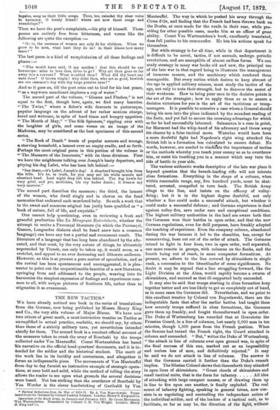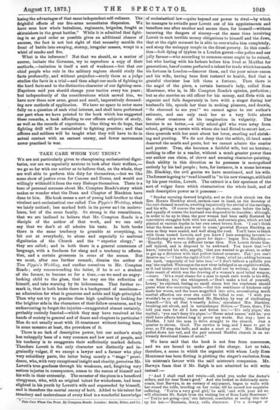THE NEW TACTICS.*
WE have already noticed one book in the series of translations -from the German, now being published by Messrs. Henry King and Co., the very able volume of Major Blume. We have now -two others of great merit, a most instructive treatise on Tactics as -exemplified in actual practice, readable, we should say, by others than those of a strictly military turn, yet nevertheless intended 'chiefly for them. The second book is a succinct official account of -the measures taken to crush the army of Bonrbaki by the troops collected under Von Manteuffel. Count Wartensleben has based 'his narrative on the official head-quarters' documents, and it is in- ,tended for the soldier and the historical student. The merit of the work lies in its lucidity and correctness, and altogether it forms an indispensable piece. The movements of Von Manteuffel .from day to day furnish an instructive example of strategic opera- tions, at once bold and solid, while the method of telling the story Allows the reader to see upon what grounds the several decisions were based. Not less striking than the overthrow of Bourbaki by Von Werder is the clever hoodwinking of Garibaldi by Von
• Tactical Deductions from the War of 1870-71. - By A. Von Bogailawskl. Trans- lated from the German by Colonel Lumley Graham. London: Henrys. King and CO.
Operations of the South Army, in January and February, 1871. By Count Herrmann Von Wartensleben. Translated by Colonel C. H. Von Wright. London: Henry ..8. King and Co.
Manteuffel. The way in which he pushed his army through the Cotes d'Or, and finding that the French had been thrown back on the Doubs, at once made for the roads in their rear, while pro- viding for other possible cases, marks him as an officer of great ability. Count Von Wartensleben's book, excellently translated, does full justice to his commander. He lets his actions speak for themselves.
But while strategy is for all time, while in that department it is difficult to be novel, tactics, if not annuals, undergo periodic revolutions, and are susceptible of almost endless forms. We can study strategy in many war books old and new, the principal use of the late war in that regard being to illustrate the management of immense masses, and the machinery which rendered them manageable. But every nation which desires to keep abreast of the age in applied military science, must study the tactics of the age, not only to note their strength, but to discover the secret of their weakness. How to bring your men to the decisive points is the art of the strategist; how to apply them so as to ensure a decision victorious for you is the art of the tacticians or troop- managers. It is possible to conceive a case where a General should bring his men into the place indicated by the soundest reading of the facts, and yet fail to secure the crowning advantage for which so far he had successfully laboured. Salamanca is a ease in point, for Marmont had the whip-hand of his adversary and threw away his chance by a false tactical move. Waterloo would have been a more doubtful fight had Napoleon's right wing attacked the British left in a formation less calculated to ensure defeat. No words, however, are needed to vindirate the importance of tactics or the methods whereby you touch your enemy so as to overthrow him, or resist his touching you in a manner which may turn the tide of battle to your side.
The various authentic works descriptive of the late war place it beyond question that the breech-loading rifle will not tolerate close formations. Everything in the shape of a column, when within reasonable range, say, five hundred yards, must be shat- tered, arrested, compelled to turn back. The British Army clings to the line, and insists on the efficacy of volley- firing; but it is in the highest degree doubtful, not only whether a line could make a successful attack, but whether it could make a successful defence ; and German experience is dead against volley-fire, save under rare and exceptional conditions. The highest military authorities in the land are aware both that the Germans won their battles in open order, and that the new German regulations, even for drill purposes, have frankly adopted the teaching of experience. Even the company column, abandoned during the war because it led to the shambles, has, except for manceuvring, been cut out of the order of attack. The Germans intend to fight in four lines, two in open order, well separated, one more remote in groups, with columns on the flanks, and the fourth being out of reach, in some compacter ,formations. At present, we adhere to the line covered by skirmishers in single rank, a concession to the bfeechloader of some significance. No doubt it may be argued that a line struggling forward, like the Light Division at the Alma, would rapidly become a swarm of skirmishers, and succeed as that ill-supported body succeeded.
It may also be said that troops starting in close formation keep together better and are less likely to get so completely out of hand, as in some cases the Germans did. Nevertheless, and we point to this excellent treatise by Colonel von Boguslawski, there are the indisputable facts that after the earlier battles had taught them how severely troops suffered in close formations, the Germans gave them up frankly, and fought thenceforward in open order. The Duke of Wurtemberg has recorded that at Gravelotte the Prussian Guard, in a line of columns, lost nearly 6,000 men in ten minutes, though 1,500 paces from the French position. When the Saxons had turned the French right, the Guard attacked in column and succeeded. "But," writes the Duke of Wurtembarg, "the attack in line of columns over open ground was, in spite of the final success of this one, marked out as an impossibility and useless loss of men, and definitively rejected." It may be said we do not attack in line of columns. The answer is that the Germans carried it further than the Duke's remark implies. The Silesian Colonel shows that thenceforth they attacked in open lines of skirmishers. "Great clouds of skirmishers and small tactical units, that is the form for infantry All idea of attacking with large compact masses, or of drawing them up in line to fire upon one another, is finally exploded. The real secret of infantry fighting, speaking in general terms, now con- sists in so regulating and controlling the independent action of the individual soldier, and of the leaders of a tactical unit, as to facilitate, as far as may be, the direction of the fight, without losing the advantages of that same independent self-reliance. The frightful effects of our fire-arms necessitates dispersion. We have seen how whole battalions, regiments, brigades, fought as skirmishers in the great battles." While it is admitted that fight- ing in as good order as possible gives an additional chance of success, the fact is not lost sight of that necessity moulds the front of battle into swaying, stormy, irregular masses, wrapt in a whirl of smoke and fire.
What is the inference? Not that we should, as a matter of course, imitate the Germans, try to reproduce a copy of their methods,—imitation is itself a sort of weakness—but that our chief people who rule in the military regions should study the facts profoundly, and without prejudice—study them as a judge studies the facts in a trial—and then adapt our mode of fighting to the hard facts and to the distinctive character of our fighting-men. Napoleon said you should change your tactics every ten years ; but independently of the considerations which moved him, we have now these new arms, great and small, imperatively demand- ing new methods of application. We have no space to enter more fully on a question of such vital interest, and shall have performed our part when we have pointed to the book which has suggested these remarks, a book affording to our officers subjects of study, as well as the records of experience. One thing we do hope, that fighting drill will be assimilated to fighting practice ; and that officers and soldiers will be taught what they will have to do in actual contact with an earnest enemy, and fewer movements never practised in war.



































 Previous page
Previous page